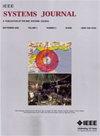Distributed Containment Control for Discrete-Time Nonlinear Multiagent Systems Over Dynamic Topology With System Uncertainties
IF 4.4
3区 计算机科学
Q1 COMPUTER SCIENCE, INFORMATION SYSTEMS
引用次数: 0
Abstract
This article explores the distributed containment control problem under dynamic directed topologies in discrete-time nonlinear multiagent systems (MASs) subject to parameter uncertainties that are nonlinearly coupled with the agents' states. Specifically, a parameter estimation algorithm is first adopted to deal with the parametric uncertainty. Then, based on the estimated parameters, a distributed adaptive containment control protocol is proposed in a distributed fashion for nonlinear and uncertain MASs over dynamic digraphs. To tackle the challenges caused by the dynamic topology, the evolution of the dynamic topology of MASs is transformed into time-varying Markov chains. By analyzing the characteristics of time-varying Markov chains, the properties of some key matrices related to the dynamic topology are derived, which benefits the convergence analysis of containment control. By applying the proposed control protocol, the reference signals can be tracked by the leaders, while the followers' states are driven into the convex hull formed by leaders. Finally, simulation results and performance analysis are discussed to demonstrate the effectiveness of developed methods.具有不确定性的动态拓扑上离散非线性多智能体系统的分布式包容控制
本文研究了离散时间非线性多智能体系统(MASs)中参数不确定性与智能体状态非线性耦合的动态有向拓扑下的分布式包容控制问题。具体来说,首先采用参数估计算法来处理参数的不确定性。在此基础上,针对动态有向图上的非线性不确定质量,提出了一种分布式自适应控制协议。为了解决动态拓扑带来的挑战,将质量的动态拓扑演化转化为时变马尔可夫链。通过分析时变马尔可夫链的特征,得到了与动态拓扑相关的一些关键矩阵的性质,有利于遏制控制的收敛性分析。通过应用所提出的控制协议,参考信号可以被领导者跟踪,而追随者的状态被驱动到领导者形成的凸包中。最后,通过仿真结果和性能分析验证了所开发方法的有效性。
本文章由计算机程序翻译,如有差异,请以英文原文为准。
求助全文
约1分钟内获得全文
求助全文
来源期刊

IEEE Systems Journal
工程技术-电信学
CiteScore
9.80
自引率
6.80%
发文量
572
审稿时长
4.9 months
期刊介绍:
This publication provides a systems-level, focused forum for application-oriented manuscripts that address complex systems and system-of-systems of national and global significance. It intends to encourage and facilitate cooperation and interaction among IEEE Societies with systems-level and systems engineering interest, and to attract non-IEEE contributors and readers from around the globe. Our IEEE Systems Council job is to address issues in new ways that are not solvable in the domains of the existing IEEE or other societies or global organizations. These problems do not fit within traditional hierarchical boundaries. For example, disaster response such as that triggered by Hurricane Katrina, tsunamis, or current volcanic eruptions is not solvable by pure engineering solutions. We need to think about changing and enlarging the paradigm to include systems issues.
 求助内容:
求助内容: 应助结果提醒方式:
应助结果提醒方式:


